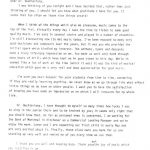“Please” and “Thank you” are probably among the earliest words you learned to say, sometime after “Mama” and “Dada” and before “If it would not be too cumbersome” and “Much obliged.” We quickly learn that using those words is foundational to developing social skills and getting along with people. However, “Thank you” is much more than just a social courtesy. They are two very powerful words!
I’m grateful for everyone who reads my posts, but since my primary audience is Canadian ministry leaders, all of the following points are from the perspective of a team leader.
Let’s take a look at why saying “Thank you” is good for you as a leader.
“Thank You” Helps Conquer Pride
Leaders often get the credit for the success of their organizations, and if you read stories about leaders, it often sounds like they did it all by themselves. If leaders actually believe this, well, pride is one of the temptations that can bring a leader down:
- Pride leads to hubris, feelings of invincibility, omnipotence, and omniscience. What could go wrong? Hmm.
- Pride leads to self-aggrandizement. Who wants to work for someone who thinks they can do it all by themselves?
- Pride negates the role that God plays in your life. But in response, God says: “You may say to yourself, ‘My power and the strength of my hands have produced this wealth for me.’ But remember the Lord your God, for it is he who gives you the ability to produce wealth.”1
Taking pride in your work, in the sense of satisfaction with a job well done, is quite okay. But pride beyond that is a danger to avoid. A great way to do that is to say “Thank you” sincerely and often to all the people who helped you get those great results.
Saying “Thank you”:
- is an admission that you didn’t do it all yourself
- recognizes that you are indebted to others who helped you out
- reminds you that you are part of a team and not ‘flying solo’
Saying “Thank you” keeps you humble and is a crucial part of leadership success.
“Thank You” Affirms the Recipient
A basic human longing is to feel needed and appreciated. We all like to contribute to the common good, and especially want to do good for those close to us, including the people we work with and for.
Every time you say “Thank you,” you are contributing to someone else’s self-esteem. “Thank you” tells people you notice and appreciate them. You are validating their knowledge, skill, and judgment all in one simple phrase. Your appreciation affirms who they are and their place in your workforce. I know staff will say “Thank you” to each other, and that is great for team spirit. But they need to hear it from “the organization” too. That’s what is special about a leader expressing thanks: it is both a personal and a corporate thanks.
Thanking staff members and volunteers is just good stewardship of the people whom God has placed under your leadership. I’m sure we both want them to flourish as the people God made them to be. “Thank you” is part of developing them, of building their confidence in what they are doing. You nurture your staff when you affirm everything you can. It will inspire them to expand their abilities and realize more of their potential.
One of the best rewards I could receive in Heaven is to hear Jesus say not just “Well done, thou good and faithful servant”, but also “Thank you for nurturing and tending my people whom I entrusted into your care.” Sure, I want to know that I personally lived up to Jesus’ expectations of me. But even more than that, I want to know that I helped others do so too.
And there’s another benefit that flows back to you from saying “Thank you.” Helping other people feel affirmed and valued actually contributes to your own self-esteem too! Don’t you feel good by making others feel good?
“Thank You” Encourages People
You never know what is really going on in someone’s life. They could be having a terrible day, or enduring a long term agony, and because they put on a brave face you have no idea. A simple “Thank you” can make their day and give them something positive to reflect on.
The best kind of “Thank you” for encouraging people is thanking them for something about them that has endured over the long term. In addition to thanking them for a specific task they performed, you can thank them for a quality such as thoughtfulness, willingness to help, courage, and so forth. These are personal traits, so you are really saying you value them not so much for what they do but for who they are.
Each month, CCCC sends an email to one-twelfth of our members, inviting them to submit prayer requests for our staff to pray for at our staff meetings. In the note, I thank them for the good work they are doing for the cause of Christ. A pastor recently wrote in response mentioning the ups and downs of ministry life that he experiences, and which wouldn’t necessarily be apparent to others:
Thank you for praying – there are times when ministry seems so easy, walking in the power of the Spirit seems so natural and everything seems right in the world….and then there are times when it just is hard, even just walking with God is a difficulty. But, praise God, there is power in prayer. Thanks for praying and for reminding us that you are praying; we are so blessed to have men and organizations like you to come alongside of us and allow God to use you. May God bless you for your part!
We were both encouraging each other! And I believe encouragement is a crucial contributor to building perseverance. I have sent a few notes to ministry leaders who I knew were in great distress, to thank them for their perseverance and to encourage and remind them that others are aware and are standing with them. These notes are always appreciated. They don’t have to be long to be effective. Someone did a shout out to me recently on Facebook and Twitter, and what an encouragement it was!

You May Be the Only One to Say “Thank You”
Sometimes we think of saying “Thank you” and then don’t, because we figure the person doesn’t need one more expression of thanks. But that’s a major assumption. They may be soldiering on because this is what they are called to do, but they are doing so without a lot of positive feedback. Everyone appreciates acknowledgement, and you may be the only person who gives it!
I was not aware that someone I knew had died until after the funeral. My jaw dropped when my parents told me later about what the man’s widow said to them at the visitation. Let me set the context and tell the story:
I sang for years in the Children’s choir at Timothy Eaton Memorial Church under the direction of Dr. David Ouchterlony. He was a demanding choirmaster and although I enjoyed singing in church every week, the twice weekly rehearsals were not always fun.
In 1985 I was listening to a symphony and thought about how much enjoyment music gave me and how my love of music came from my years with Dr. Ouchterlony.
He was an important man: Principal of the Royal Conservatory of Music Toronto, Executive Director of the Kiwanis Music Festival, host of a radio show on CFRB, and just generally famous. Would my one letter of thanks matter to him? I wrote it anyway and I got a short note back thanking me.
He died just 21 months later and his widow said that in his entire career of working with students and choir members, mine was the one and only “thank you” letter he ever received from any of them. She said he left my letter open on his desk where he could see it every single day! Never think a “Thank you” isn’t important! I can’t help thinking of Jesus and the ten men he healed of leprosy.
And little did I know that time was running out to say “Thank you” to “D.O”! Had I procrastinated, he would never have known of my feelings.

Paul writes that we are to “encourage one another and build each other up.”2 “Thank you” and other words of encouragement can literally change people’s lives. Dustin Willis notes in his book Life in Community that his life was changed by only six simple words. Someone said to him, “I see God working in you.”3
Saying “Thank You” Blesses You
Every time I say “Thank you” to someone:
- it blesses me because it reminds me of some way that the other person has benefitted me.
- who is on my staff, I am reminded of what a great team I have, and I thank God for bringing these people to CCCC. I feel very blessed that I have something to thank them for.
- it reminds me of the many blessings God pours into my life each and every day – many of which might otherwise be unnoticed or taken for granted.
- I become a happier person as I notice the many good things I have to be thankful for.
I am a very blessed man, not because of what I have done for myself, but for what God and other people have done.
So,
The question for you to ask yourself is, “Who else can I encourage by thanking them?”
- Deut 8:17-18 ↩
- 1 Thess 5:11 (NIV) ↩
- Life in Community. p 107. ↩



Thanks John for the reminder to say ‘thank you.’ And on that note, I wish to say thank you for your leadership at CCCC as well as to the staff who are so very helpful every time I communicate with them. This organization is truly a blessing and I am privileged to be associated with it!
Thank you Lori. I feel a little lighter and happier after a comment like that! Blessings.
Thank you, John, for your thoughtful article. While reading it I recalled how when, a few years back when I had finished my graduate degree in business, I wrote a handful of letters to mentors who had been formative in my growth in maturity, career and faith. I don’t believe I heard any replies, but prompted by your story, I am glad that I took the time to do that. Remembering those gracious mentors stirs warm memories yet again.
To the CCCC: In every contact I have had with the CCCC, I have been grateful and impressed with the professionalism and vast knowledge shown by staff and the practical help I have come away with.
Thanks James. I’m sure your mentors enjoyed hearing how things turned out for you. I’ll pass your thanks along to the staff.
Blessings!